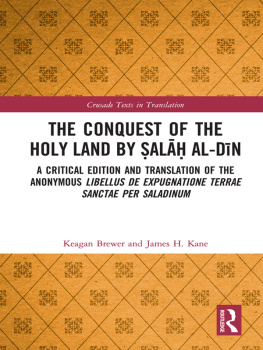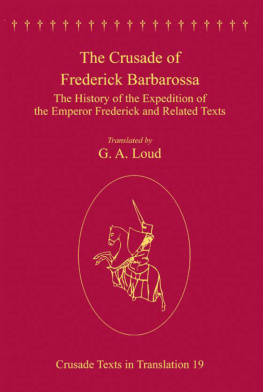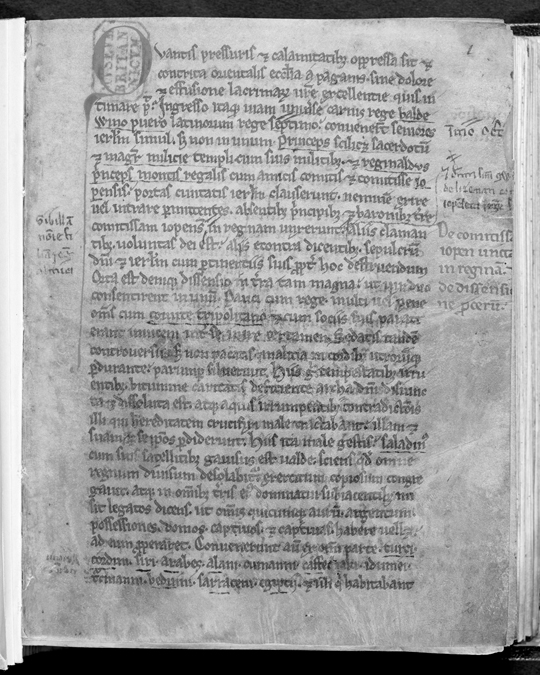Table of Contents
The Conquest of the
Holy Land by al al-Dn
The Libellus de expugnatione Terrae Sanctae per Saladinum (or Little Book about the Conquest of the Holy Land by al al-Dn) is the most substantial contemporary Latin account of the conquest of the Kingdom of Jerusalem in 1187. Seemingly written by a churchman who was in Jerusalem itself when the city was besieged and captured, the Libellus fuses historical narrative and biblical exegesis in an attempt to recount and interpret the loss of the Holy Land, an event that provoked an outpouring of grief throughout western Christendom and sparked the Third Crusade. This book provides an English translation of the Libellus accompanied by a new, comprehensive critical edition of the Latin text and a detailed study in the introduction.
Keagan Brewer and James H. Kane are both historians of the crusades at the University of Sydney, Australia. Keagan Brewer is an Honorary Research Associate at the Medieval and Early Modern Centre and James H. Kane is a lecturer in medieval language and literature.
Crusade Texts in Translation
Editorial Board
Malcolm Barber (Reading), Peter Edbury (Cardiff),
Norman Housley (Leicester), Peter Jackson (Keele)
About the series
The crusading movement, which originated in the 11th century and lasted beyond the 16th, bequeathed to its future historians a legacy of sources which are unrivalled in their range and variety. These sources document in fascinating detail the motivations and viewpoints, military efforts and spiritual lives, of the participants in the crusades. They also narrate the internal histories of the states and societies which crusaders established or supported in the many regions where they fought. Some of these sources have been translated in the past but the vast majority have been available only in their original language. The goal of this series is to provide a wide-ranging corpus of texts, most of them translated for the first time, that will illuminate the history of the crusades and the crusader-states from every angle, including that of their principal adversaries, the Muslim powers of the Middle East.
Titles in the series include
Keagan Brewer and James H. Kane
The Conquest of the Holy Land by al al-Dn
Graham Loud
The Chronicle of Arnold of Lbeck
Carol Sweetenham
The Chanson des Chtifs and Chanson de Jrusalem
Anne Van Arsdall and Helen Moody
The Old French Chronicle of Morea
Keagan Brewer
Prester John: The Legend and its Sources
Martin Hall and Jonathan Phillips
Caffaro, Genoa and the Twelfth-Century Crusades
First published 2019
by Routledge
2 Park Square, Milton Park, Abingdon, Oxon OX14 4RN
and by Routledge
52 Vanderbilt Avenue, New York, NY 10017
Routledge is an imprint of the Taylor & Francis Group, an informa business
2019 Keagan Brewer and James H. Kane
The right of Keagan Brewer and James H. Kane to be identified as authors of this translation has been asserted by them in accordance with sections 77 and 78 of the Copyright, Designs and Patents Act 1988.
All rights reserved. No part of this book may be reprinted or reproduced or utilised in any form or by any electronic, mechanical, or other means, now known or hereafter invented, including photocopying and recording, or in any information storage or retrieval system, without permission in writing from the publishers.
Trademark notice: Product or corporate names may be trademarks or registered trademarks, and are used only for identification and explanation without intent to infringe.
British Library Cataloguing-in-Publication Data
A catalogue record for this book is available from the British Library
Library of Congress Cataloging-in-Publication Data
A catalog record has been requested for this book
ISBN: 978-1-138-30805-3 (hbk)
ISBN: 978-1-315-14276-0 (ebk)
Typeset in Times NR MT Pro
by Cenveo Publisher Services
In loving memory of Jenny Green:
medievalist extraordinaire and incomparable friend
Lors veissiez mult gent plorer,
e li rois sanz plus demorer,
qui encore ert mult desheitiez,
entra en mer a lor congiez,
e fist al vent lever les veilles
e curut la nuit as esteilles.
(Ambroise, Estoire de la guerre sainte, ll. 1228312288)
Contents
Maps
Figures
This project began nearly ten years ago at the University of Sydney under the leadership of Associate Professor John H. Pryor. It emerged from a special subject on the sources for the Third Crusade that John taught in 2008 and 2009 to a small group of undergraduate students completing or planning to complete Honours in Medieval Studies. That group of students included the authors of this book. What initially drew us all to this unusual text with its curious reference to the man with the arrow through his nose is difficult to say, but we soon decided to collaborate on a new edition and translation of the Libellus.
Our leading lights in those early days were John himself and our friend and fellow student Jenny Green. Thanks to John's firm guidance and meticulous scholarship, and Jenny's boundless enthusiasm for the project, work proceeded quickly at first. It was a wonderful time of shared historical passion and scholarly discovery that coincided with a blossoming of undergraduate Medieval Studies at the University of Sydney and, at least for the two of us, played a crucial role in making us the historians we are today. A particular highlight for all of us was the week in January 2009 that we spent producing our initial translation at John's home away from home at Jervis Bay on the south coast of New South Wales. This was a process that naturally called for a steady supply of wine and led to some robust discussionsmany of them topical rather than strictly on-topic. (Jenny's unforgettable claim one morning that she had dreamed of polar bears sitting on shrinking ice floes and singing lines from the Lamentations of Jeremiah should give a sense of the range of issues we touched on.) But the week was ultimately very productive. By the end of 2009, we had a working translation of the text, facsimiles of all four medieval manuscripts, and the beginnings of a collation.
Momentum on the project steadily ebbed over the next few years. By the time the two authors of this book began their respective doctoral studies in Sydney and Cambridge, the other main contributors had moved on to different projects, degrees, jobs, or life priorities. John himself was becoming increasingly (and understandably) preoccupied with a complex project on the primary chronicles of the First Crusade that will hopefully be published in the near future. Due to these various commitments, all work on the Libellus effectively stalled. It was only in 2015 that we held some scattered discussions about the possibility of reigniting the project. Whether any future efforts would involve all of us was unclear at the time, but two unforeseen events (one tragic, and one nearly so) in as many years resolved that question for us cruelly and decisively.
The first and most painful blow came in November 2015, when Jenny passed away. Though she had been unwell since July, her death came as a complete shock and left us utterly heartbroken. Jenny was a supremely talented and instinctive medievalist who had an astounding knowledge of the Vulgate Bible, a profound grasp of exegesis, and an ability to draw connections with a deftness that regularly left her peers and teachers stunned. She was also a unique and irreplaceable friend. Her absence from this world is a gaping wound that will never heal, and we cannot imagine dedicating this book to anybody but her.









